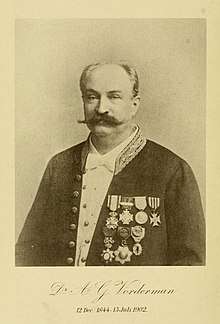Adolphe Vorderman
Adolphe Guillaume Vorderman (12 December 1844 – 15 July 1902) was a Dutch physician and scientist whose extensive and scrupulous study[1] of the link between polished rice and beriberi in the Dutch East Indies in 1897 helped lead to the discovery of vitamins. His great-granddaughter is British television presenter Carol Vorderman.
Adolphe Guillaume Vorderman | |
|---|---|
 | |
| Born | 12 December 1844 |
| Died | 15 June 1902 (aged 57) |
| Nationality | Dutch |
| Occupation | Physician |
| Known for | Research into beriberi |
| Relatives | Carol Vorderman (great-granddaughter) |
Biography
Vorderman, who was born in The Hague, first travelled to the Dutch East Indies in 1866 as a Naval Medical Officer. In 1871 he joined the Civil Health Department, and was stationed at Sumenep on the island of Madura until 1881 when he was transferred to Batavia (now Jakarta). From 1890 until his death in Batavia, he served as Chief Inspector of the department.[2]
Beriberi study
In 1883 the Dutch government sent Christiaan Eijkman to the Dutch East Indies (now Indonesia) to try to determine the cause of and find a cure for beriberi. He noticed that chickens fed polished rice – which is rice which has had its bran removed – developed a similar paralysis in their legs. Before he could follow up on this line of enquiry, ill health forced him to return home to the Netherlands. Before leaving he asked his friend Adolphe Vorderman, who was Chief Medical Officer, to continue the research on the link between rice and the disease.
Vorderman, who had already noted that beriberi occurred a lot in some prisons, but very little in others, decided to conduct a preliminary survey of the type of rice served in a sample of prisons. When that initial study seemed to confirm a link, he decided to conduct a complete study of all prisons.
In 1897 Vorderman visited all of the around 100 prisons on the island of Java. He took samples of the prison rice and examined the prison records to determine the number of beriberi cases. He kept the real purpose of his visits secret so that word did not get around the Chinese rice suppliers and lead them to change the type of rice they provided.[3]
Later he conducted blind testing with rice experts to discover the make-up and origin of the rice varieties he found in the prison samples.
Vorderman found that in the prisons using mostly brown rice, the incidence of beriberi was less than 1 in 10,000. In the prisons serving mainly polished white rice the proportion was 1 in 39. In his published report, he concluded that this marked difference could not be explained by any other nutritional or sanitary factor.
Later others, including Gerrit Grijns, took over the research which ultimately led to the discovery of vitamins. In the case of beriberi, the vitamin that was lost when the bran was removed was thiamin – vitamin B1.
In a 2007 episode of the BBC genealogical documentary series Who Do You Think You Are?, Carol Vorderman researched her great grandfather Adolphe. In the episode, the Director of the Eijkman Institute stated his opinion that had he still been alive at the time, Adolphe Vorderman should have shared the Nobel Prize in Medicine with Eijkman and Sir Frederick Hopkins, who were awarded the prize in 1929 for their vitamin-related work. During the programme, there was no discussion on whether the dead can be awarded the Nobel Prize.
Other work
Apart from his nutritional study Vorderman published papers on local poisons, drugs, foods and birds, and was a collector of botanical specimens. For his work he was made an honorary Doctor of Science by Utrecht University. The tree species Myristica vordermanni was named in his honour by Otto Warburg.[2] Vorderman became a corresponding member of the Royal Netherlands Academy of Arts and Sciences in 1889.[4]
References
- Vorderman, A.G. (1897). Onderzoek naar het verband tusschen den aard der rijstvoeding in de gevangenissen op Java en Madoera en het voorkomen van beri-beri onder de geïnterneerden [Research into the link between the nature of the rice diet in prisons in Java and Madura and the prevention of beriberi among the internees] (in Dutch). Batavia: Jav. Boekh. & Drukkerij.
- "Vorderman A.G." National Herbarium of the Netherlands. 2007. Retrieved 11 August 2014.
- Vandenbroucke, Jan P. (2013). "Adolphe Vorderman's 1897 study on beriberi: an example of scrupulous efforts to avoid bias". Journal of the Royal Society of Medicine. 106 (3): 108–111. doi:10.1177/0141076813478790. PMC 3595404. PMID 23481433.
- "Adolphe Guillaume Vorderman (1844–1902)". Royal Netherlands Academy of Arts and Sciences. Retrieved 25 January 2016.
External links
- Carpenter, Kenneth J. (22 June 2004). "The Nobel Prize and the Discovery of Vitamins". nobelprize.org.
- "Christiaan Eijkman - Biography". nobelprize.org. 2014.
- Adolphe Vorderman's 1897 study of beriberi among prison inmates in the Dutch East Indies
- Adolphe Vorderman by Gercon Vorderman